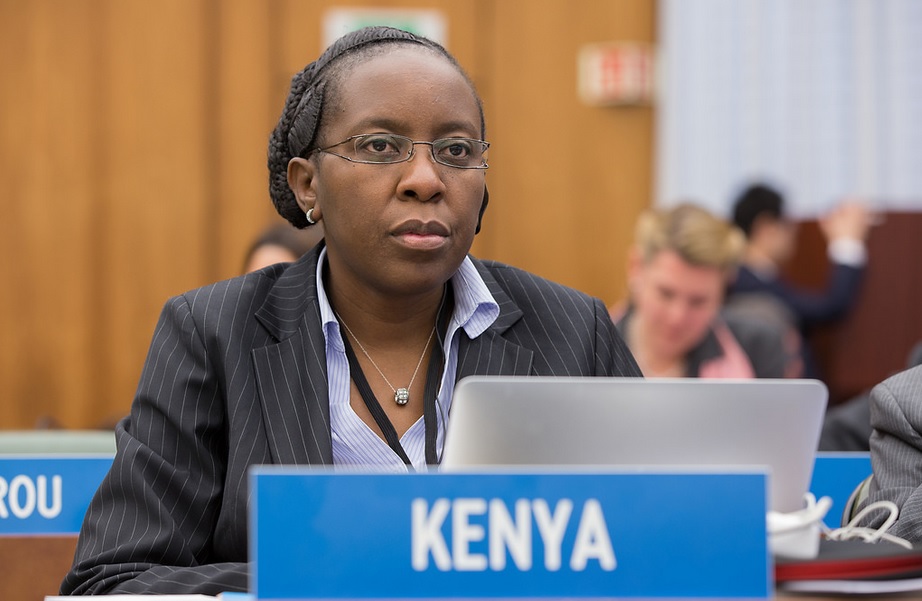The Next Six Years: Protection of Traditional Knowledge and Broadcasting Organisations
- Victor Nzomo |
- May 14, 2014 |
- CIPIT Insights

Dr. Marisella Ouma of Kenya Copyright Board (KECOBO) at WIPO. KECOBO is the lead state agency on protection of broadcasting organisations and traditional knowledge at domestic and international levels.
Earlier this month, Dr. Francis Gurry gave his acceptance speech following his successful re-election as World Intellectual Property Organization (WIPO) Director General. In this speech, Gurry outlined clearly the focus of his second term. His speech stated in part:
I believe that the successful conclusion of the Beijing and Marrakesh Treaties shows us that it is easier to reach a shared understanding on specific issues, where there is a demonstrable and manageable need for international action, than to achieve a shared understanding across the whole range of intellectual property, which now underlies most economic and cultural activities. As we go forward on such specific issues, it will be important that the agenda address the interests of all sides of the multilateral equation. This means that the Organization must be able to address both the high end and the low end of technology. In concrete terms, for example, the Organization must achieve successful outcomes both on broadcasting and on traditional knowledge, traditional cultural expressions and genetic resources.
A Kenyan interpretation of Gurry’s speech is that the Kenya Copyright Board (KECOBO) will once again be at the centre of Kenya’s push for new legal instruments in the international intellectual property (IP) system. Under Dr. Ouma’s careful watch at KECOBO, Kenya was actively represented in the negotiations and successful conclusions of the Beijing Treaty on Audiovisual Performances (see our commentary here) and the Marrakesh Treaty to Facilitate Access to Published Works for Persons Who Are Blind, Visually Impaired, or Otherwise Print Disabled (see our commentary here).
However, in light of the on-going parastatal reforms (See our commentary here and here), KECOBO will no longer spearhead Kenya’s representation at the WIPO Standing Committee on Copyright and Related Rights (SCCR) and the WIPO Intergovernmental Committee on Genetic Resources, Traditional Knowledge and Folklore (IGC). This role will now be taken over by the proposed new IP agency, the Intellectual Property Office of Kenya (IPOK). Recently, this blogger was reliably informed that within the organisational structure of IPOK, there will be a Directorate of Copyright headed by a Deputy Director General in charge of Copyright who will report directly to the Director General. In addition, there will be two Managers: one in charge of copyright and the other in charge of Traditional Cultural Expressions (TCEs) and Collective Management Organsiations, both of whom will report to the Deputy Director General in charge of Copyright.
IPOK would be well advised to maintain close ties with the out-going KECOBO Director, Dr. Ouma whose management team has been actively involved in the domestic and international steps taken in the protection of Traditional Knowledge (TK) and rights of broadcasting organisations.
At the recently concluded 27th Session of SCCR, this blogger probed Dr. Ouma on whether there was any need to have international protection for broadcasting organisations. Her response was as follows:
“This is is a discussion that has been going on for the last 16 years. The Rome Convention was meant to deal with the rights of broadcasting organisations but never really came into force as most of the member states did not ratify it for various reasons. With the ever-changing technologies, there are various issues that have come up which were discussed at various fora around the world. There is need to update the Rome Convention and offer the minimum protection that is acceptable for all member states.”
To follow-up, this blogger questioned Dr. Ouma on the precise scope of the protection to be afforded to broadcasting organisations. Her response was as follows:
“Kenya believes that the 2007 mandate is clear that the protection will be signal based for broadcasters and cablecasting organisations in the traditional sense. This means that it is restricted to the broadcast signal and will only apply to traditional broadcasters and cable casters.”
On the TK front, KECOBO has taken the lead in developing a legal and administrative framework for the protection of Traditional Knowledge (TK) both as a part of the TK Inter-Ministerial Committee and previously as a part of the defunct special TK Taskforce appointed and gazetted by the Honourable Attorney General.
The defunct task force successfully prepared Kenya’s National Policy on Traditional Knowledge Genetic Resources and Cultural Expressions, 2008. The current Inter-Ministerial Committee has come up with a draft Bill called the Protection of Traditional Knowledge and Traditional Cultural Expressions Bill, 2013 (See our commentary here). In this regard, this blogger notes that the clock is ticking for the TK Inter-Ministerial Committee since Article 11(3) as read with the Fifth Schedule of the Constitution requires that the TK legislation must be enacted no later than August 27, 2015!
